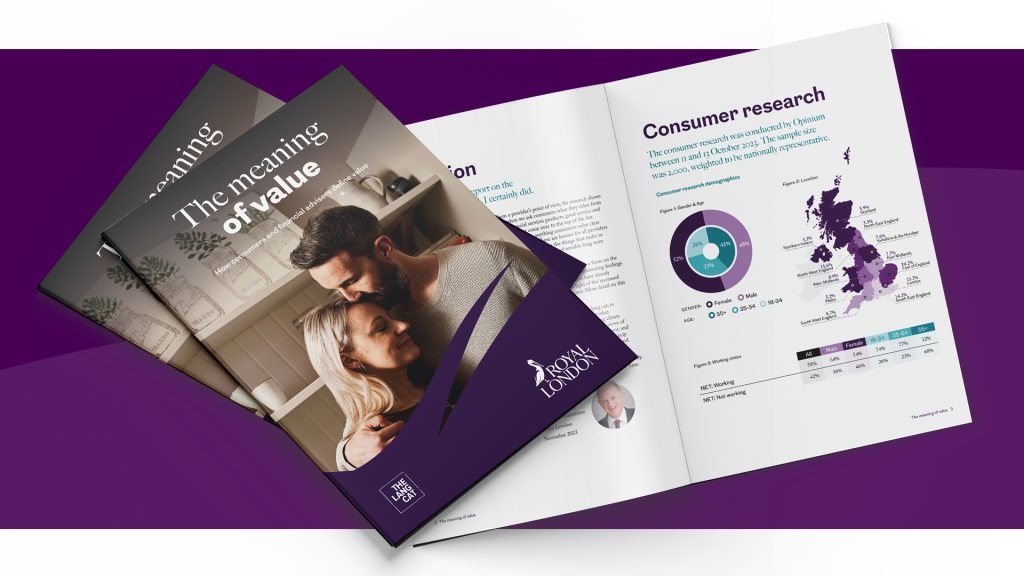How does the advice profession deliver and demonstrate its value?
The question of value is something that’s attracted increasing regulatory scrutiny, whether through the emphasis on fair value under the Consumer Duty, or through the FCA’s work to scrutinise the value being delivered by asset managers, pension providers and insurers.
From an advice and planning perspective, the challenge is in measuring something that is nuanced and hard to quantify.
To understand this issue more deeply, we’ve worked together with Royal London to examine the meaning of value. How do consumers perceive value, and does this align with advisers’ perceptions?
Alongside consumer research, we carried out in-depth interviews with advisers and planners to hear about value from their point of view.
This is a snapshot of some of those discussions, which show value is something firms are thinking hard about – even if they don’t have all the answers yet.
Demonstrating value
At a basic level, the value of financial planning can be calculated in monetary terms based on tax saved or investment growth. But every advice professional knows the value they provide goes deeper than that.
According to the planners we spoke to, some clients value the help they get in understanding pensions or investments they already have. Others value the softer side of working with an adviser – the reassurance, handing over the ‘hassle’ of their financial lives, or being stopped from making a costly mistake.
We carried out in-depth interviews with advisers and planners to hear about value from their point of view.
One planner told us sometimes the role is more akin to a counsellor, being that person clients can call in a family crisis, or who can act as a sounding board that’s outside of close friends and family.
“Generally advisers are demonstrating their value all the time, because clients are free to say: ‘I don’t need or want this anymore.’
“Yet demonstrating value, which you’re required to do under the Consumer Duty, is the thing that most businesses are struggling with. Because value is not defined. It can be a whole range of different things.”
Many firms we heard from use client surveys as a way of measuring the value they deliver. But there was also an acknowledgement that value is sometimes out of advisers’ hands, because it’s tied up in the service received from platforms and providers.
Client understanding
Planners we spoke to are broadly supportive of the focus on value, especially given how opaque the wider industry has been historically around value and charges.
They admit though that for all the work that’s been done around transparency and value, there is more to do in getting this across to clients.
One adviser said:
“Not many clients understand this, or indeed care. Probably only one in 10 clients ever push back on costs or question the value.”
This was echoed in our other adviser conversations, which pointed to clients’ inability to assess value even if they wanted to:
“It’s our responsibility to make sure we’re getting it right on value, because the people we’re dealing with don’t really have a benchmark against which to assess it… For clients, how would they know?”
“For all the goodwill and the best intentions of the regulators over the years, I don’t think we’re in the place where we need to be, if clients are going to make informed decisions about who they use and what services they go for.”
“I do worry that quite a lot of the approach we’ve got now with price and fair value is about justifying what’s already there rather than challenging it.”
“You do need a way of trying to make sure that someone knows they’re getting value and not just being taken for a ride.”
Value challenges
Nevertheless, value is something firms continue to challenge themselves on. One restricted adviser told us he had carried out a benchmarking exercise of his own, and was encouraged about the value he could deliver versus charges seen elsewhere.
“I’ve said to people the only bit you can almost turn off with fees is me really. You’ve got to pay your platform charge. If you want your funds invested, you have to pay the investment charges. It’s not essential to pay an ongoing adviser charge if you don’t want to. And a lot of them say: ‘well, no, that’s the bit we want. That’s the bit we value.’”
Others are considering whether they need to enhance their proposition for high-net-worth clients, perhaps by providing a higher level of engagement, or changing their charging structure to ensure ‘fair value’ is being delivered.
Examples of value
Yet for all the questions around how to define and measure value accurately, it’s clear that advice and planning does deliver value by the bucketload.
Oftentimes this will be to the clients directly, but occasionally it’ll go further. One adviser spoke about how clients appreciate his pro bono work outside of his work for them, such as financial education in schools. Separately, that same adviser said he once helped a homeless man find and claim on a lost pension.
Another adviser told a story that goes to show value isn’t always about boosting wealth on a spreadsheet, or even adding much to the firm’s bottom line.
The advice involved a client couple in their 70s who were facing inheritance tax problems. They have a child with special care needs, and wanted to make sure the child was taken care of in future. The adviser gave advice around passing property to children, mitigating tax and setting up trusts.
He said: “The value for my business might be minimal. But actually the value for the clients will be huge.”

The Meaning of Value report is available to download for free thanks to Royal London.
You can also watch our follow-up webinar on the report’s findings.
/ Newsletter and notifications
Never miss out on a lang cat opinion
- View our privacy policy
- View latest newsletter





